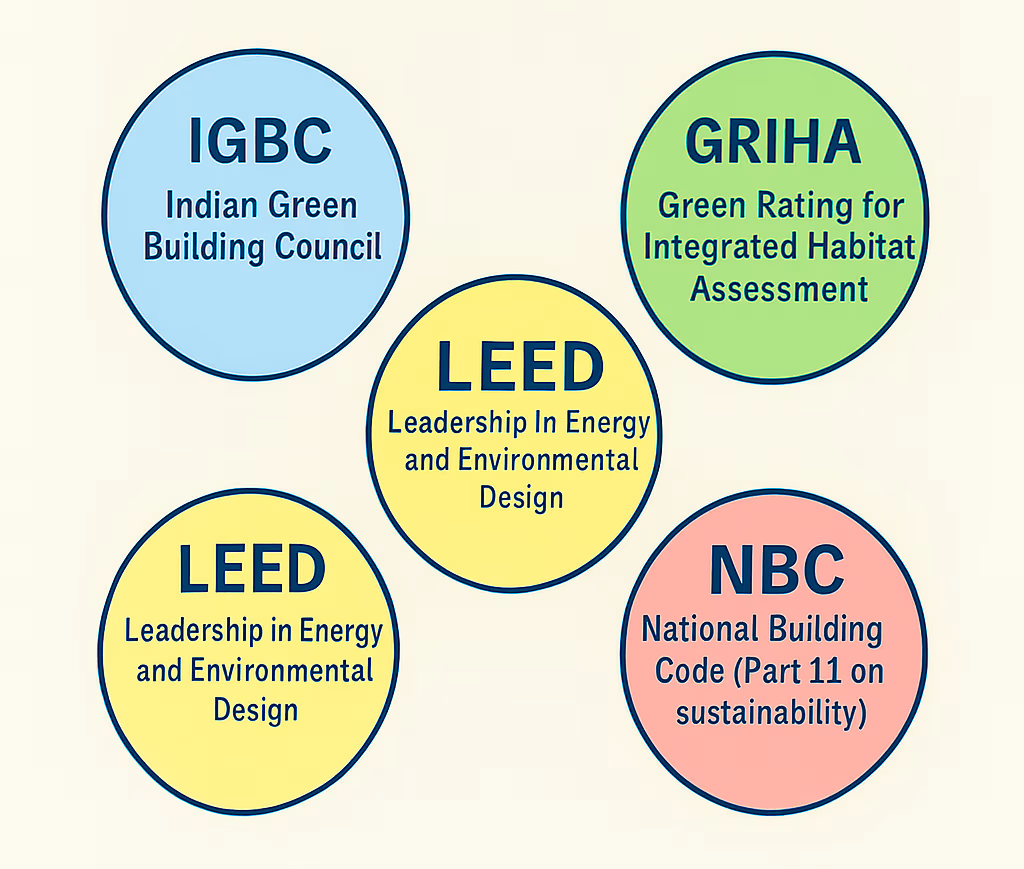Best Certifications for CSR-Funded Infrastructure in India

Table of content
In 2025, CSR-funded infrastructure projects are shaping India’s social development landscape—from building hospitals and schools to renewable energy facilities and cultural spaces. But for CSR donors and NGOs alike, a critical question arises:
Which certifications signal that a project is sustainable, compliant, and impactful?
The right certifications not only ensure compliance with statutory norms but also increase donor confidence, community trust, and long-term sustainability. This guide breaks down the top certifications relevant to CSR projects in India, their benefits, and which ones to choose depending on your sector.
10 Tips to get CSR grants faster
- Transparency & Accountability: Donors want assurance that funds are used for world-class, compliant projects.
- Sustainability: Certifications such as LEED, GRIHA, and IGBC validate eco-friendly construction practices.
- Social Impact: Certifications help projects align with Schedule VII of the Companies Act, 2013—ensuring CSR spending is compliant.
- Reputation: Certified projects stand out when NGOs or corporates showcase impact reports.
1. NABH (National Accreditation Board for Hospitals & Healthcare Providers)
- Best For: CSR-funded hospitals, health centers, eye-care projects.
- Why It Matters: NABH 6th Edition (effective Jan 2025) ensures patient safety, infection control, fire safety, and operational excellence.
- Impact: CSR donors funding hospitals prefer NABH accreditation because it enhances credibility, attracts skilled staff, and qualifies the hospital for insurance empanelment.
2. GRIHA (Green Rating for Integrated Habitat Assessment)
- Best For: Schools, healthcare centers, universities, community housing.
- Why It Matters: Developed by TERI and the Government of India, GRIHA is India’s national rating system for green buildings.
- Impact: Reduces lifecycle costs, ensures energy and water savings, and appeals to donors focused on climate action (SDG 13).
3. IGBC (Indian Green Building Council) Certifications
- Best For: Large CSR infrastructure like universities, hospitals, or office campuses.
- Why It Matters: Backed by CII, IGBC offers green ratings for schools, healthcare, affordable housing, and more.
- Impact: IGBC-certified projects help corporates report CSR under environmental sustainability while reducing operational costs.
4. LEED (Leadership in Energy and Environmental Design)
- Best For: CSR projects that need global recognition (universities, hospitals, tech-enabled community centers).
- Why It Matters: LEED-certified projects showcase alignment with international ESG goals.
- Impact: Multinational corporations funding CSR often prefer LEED as it helps in global sustainability reporting.
5. ECBC (Energy Conservation Building Code)
- Best For: CSR projects focusing on energy efficiency (schools, hostels, training centers, hospitals).
- Why It Matters: ECBC compliance ensures projects meet Bureau of Energy Efficiency (BEE) standards.
- Impact: Lowers operational costs, aligns with government energy goals, and is often a prerequisite for state approvals.
6. ISO Certifications (ISO 9001, ISO 14001, ISO 45001)
- Best For: CSR projects involving construction companies and implementing NGOs.
- Why It Matters: ISO standards validate quality management, environmental responsibility, and worker safety.
- Impact: Enhances trust between CSR donors and project executors by proving professional practices.
7. Specialized Certifications for Sectoral CSR
- Education: CBSE/NCERT affiliation, RTE compliance for CSR-funded schools.
- Healthcare: Biomedical waste management certifications, fire NOCs, and pollution control board approvals.
- Renewables: MNRE (Ministry of New & Renewable Energy) approvals for solar/wind CSR projects.
Selecting the right certification for a CSR-funded infrastructure project is not a one-size-fits-all decision. It requires balancing sectoral needs, donor expectations, budget realities, and long-term impact. Below is a practical framework:

1. Align with the Project Sector
- Healthcare Projects (Hospitals, Eye-Care Centers, Clinics):
- Best Fit → NABH 6th Edition (2025) for patient safety and service quality.
- Why → NABH is often mandatory for empanelment under Ayushman Bharat PM-JAY and many private insurers. Hospitals without it may struggle with funding and accreditation in the long run.
- Add-on → Combine with GRIHA/IGBC for energy-efficient hospital campuses.
- Best Fit → NABH 6th Edition (2025) for patient safety and service quality.
- Education Projects (Schools, Training Centers, Universities):
- Best Fit → GRIHA or IGBC (School Rating).
- Why → Both emphasize natural lighting, indoor air quality, and resource efficiency—directly impacting student well-being and operational savings.
- Add-on → CBSE/State Board approvals remain mandatory, but green certification boosts credibility in CSR audits.
- Best Fit → GRIHA or IGBC (School Rating).
- Urban or Global CSR Projects (Smart Campuses, R&D Labs, Tech Parks):
- Best Fit → LEED (Gold/Platinum).
- Why → Globally recognized, aligns with UN SDGs and ESG reporting frameworks. Multinationals funding projects often prefer LEED for global comparability.
- Best Fit → LEED (Gold/Platinum).
2. Match Donor Priorities
- Domestic Corporates (PSUs, Indian MNCs):
- Prefer GRIHA/IGBC, as these are Indian systems with government support.
- These certifications link directly with Schedule VII of the Companies Act under "environmental sustainability."
- Prefer GRIHA/IGBC, as these are Indian systems with government support.
- Multinational Corporations
- Often prioritize LEED, as it allows them to report CSR under global ESG frameworks like GRI, SASB, or CDP.
- Example: A US-based pharma company funding a hospital in India may mandate LEED alongside NABH.
- Often prioritize LEED, as it allows them to report CSR under global ESG frameworks like GRI, SASB, or CDP.
- Impact-First Donors (Foundations, Social Investors):
- Look for certifications that demonstrate community benefit + sustainability (e.g., NABH + GRIHA for health, IGBC Affordable Housing for slum rehabilitation projects).
Top CSR Doners in Education Sector
3. Consider Costs and ROI
- LEED: High certification fees + consultant costs; ideal for large-ticket CSR projects (>₹50 crore). ROI comes from global branding and alignment with ESG reporting.
- GRIHA: Cost-effective, designed for Indian climatic zones; reduces lifecycle costs through lower energy and water consumption.
- IGBC: Flexible tiers (Certified, Silver, Gold, Platinum) allow budget scaling.
- ECBC: Low-cost compliance measure, often required by state building bye-laws for schools and hospitals.
Decision Tip: If the project budget is modest (<₹10 crore), GRIHA or IGBC (basic tier) is usually sufficient. For mega projects, LEED adds global visibility.
4. Evaluate Long-Term Benefits
- Operational Savings:
- GRIHA/ECBC-compliant schools save up to 30–40% in electricity and water bills, directly benefiting NGOs managing the facilities.
- GRIHA/ECBC-compliant schools save up to 30–40% in electricity and water bills, directly benefiting NGOs managing the facilities.
- Regulatory Advantage:
- Hospitals with NABH accreditation are fast-tracked in government empanelments.
- Hospitals with NABH accreditation are fast-tracked in government empanelments.
- Reputation & Reporting:
- Certified projects perform better in CSR audits and impact assessment studies, a requirement for large CSR spends (>₹1 crore) post-2021 MCA guidelines.
- Donors: Certifications not only enhance CSR reporting and ESG scores but also de-risk investments by ensuring projects meet compliance, sustainability, and long-term performance standards.
- NGOs: A certified project proposal carries higher credibility in CSR grant evaluations, making funding approvals faster and more competitive.
- Communities: Certifications guarantee that infrastructure is safe, healthy, and resource-efficient, while also ensuring projects remain viable and impactful for years to come.

Certifications are no longer optional—they are the backbone of trust and transparency in CSR-funded infrastructure.
- Building a hospital? Go with NABH + GRIHA/IGBC.
- Setting up a school or university? Target GRIHA/IGBC + ISO 9001.
- Working on green campuses or global donor-funded projects? Consider LEED.
When NGOs and corporates choose the right certifications, they don’t just meet compliance, they build legacies of trust, sustainability, and impact.
If you’re planning a CSR-funded hospital, school, or green campus, BuiltX can help you design, certify, and deliver world-class, compliant projects.
